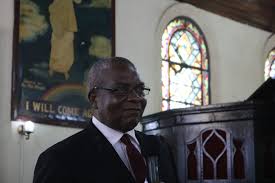By Daniel Garteh
Flag Day is one of the historical holidays in Liberian and has never lost its significant in the country.
Nimba County District # 9 Representative Johnson Gwaikolo has called on the Ministry of Education to reintroduce the teaching of civic in the Liberian school system in order Liberians to learn the importance of the flag at the early stage.
Serving as orator for Liberia’s 172nd Flag Day, Dr. Gwaikolo maintained that flag is the national symbol of the country and should be respected by all citizens at all times.
The Nimba District # 9 policy maker explained that flag can come in all forms and shapes; different colors and designs, and can be also be used in different occasions, but the materials of the flag and purpose matters.
Speaking on the Topic: “The meaning of the Liberian flag”, the Nimba lawmaker said the Liberian flag bears a striking resembling to the America flag, and a visible reminder of the historical ties between the Republic of Liberia and the United States of America.
Describing the flag, the lawmaker asserted that the signal white star in the Liberian flag represent the country as sole free black state in Africa. According to him blue filed in the flag represents the dark continent of Africa.
Gawikolo who is also co-chair at the houses committee on education called on Liberians to always pay homage to the flag as it is the national emblem.
“Honoring the flag is meant to reflect the values associated with loyalty, commitment, adherence, faithfulness, honesty, diligence and allegiance to country” he concluded
Lack of trust
However, Dr. Gwaikolo said mistrust, distrust, suspicion, intolerance, greed, and other vices created the condition that resulted into a military coup led by Master Sergeant Samuel K. Doe, who assassinated President William R. Tolbert and overthrew the government in 1980.
This, he added ended Liberia’s first republic until 1986 when a new constitution established the second republic. Samuel K. Doe then transitioned from military power to civilian rule.
“In December of 1989, the same mistrust, distrust, suspicion, intolerance, greed, and other vices violently disrupted the liberty, peace, and harmony of the second republic, resulting into fourteen years of civil crisis”, he adds.






















